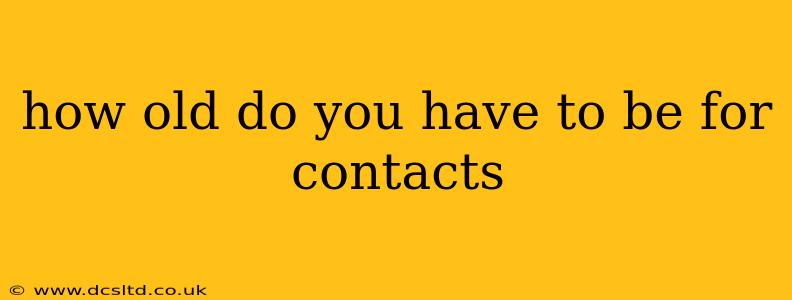The age at which you can get contact lenses isn't a single, universally mandated number. It depends on several factors, including your maturity level, ability to follow care instructions, and the recommendation of your eye doctor. While there's no legal minimum age, most eye care professionals have their own guidelines.
What is the Minimum Age for Contact Lenses?
There isn't a specific minimum age set by law for contact lens use. However, most optometrists and ophthalmologists prefer to wait until a child demonstrates the responsibility needed for proper contact lens care. This usually means at least 12 years old, though many practitioners will only prescribe them to teenagers. Even then, parental supervision is often recommended.
Why is there an age restriction (even if it's not legally mandated)?
Contact lenses require a level of responsibility that younger children may not possess. Proper handling, cleaning, and storage are crucial to prevent serious eye infections or damage. A young child might struggle with:
- Following complex cleaning instructions: Contact lens care involves meticulous steps. A younger child might miss a step or not understand the importance of thorough cleaning.
- Maintaining hygiene: Poor hygiene can lead to infections. Younger children may not always wash their hands adequately before handling their lenses.
- Understanding the risks: Children need to understand the potential consequences of improper lens care. This includes the risk of infections, eye irritation, and even vision loss.
- Adherence to the prescribed wearing schedule: Contact lenses should only be worn for a specific amount of time each day. Younger children may not always adhere to these guidelines.
Can a child younger than 12 get contacts?
While uncommon, it's possible for a child younger than 12 to get contact lenses. This would be on a case-by-case basis, solely at the discretion of the eye doctor. Factors influencing this decision could include:
- Specific medical needs: In some cases, contact lenses may be medically necessary for a younger child, perhaps due to a condition that makes glasses impractical.
- Exceptional maturity and responsibility: A child who demonstrates an exceptional level of maturity and understanding of the required care may be considered. This would involve a thorough assessment by the eye doctor.
What if my child is responsible and wants contacts?
If your child is responsible and expresses a desire for contact lenses, schedule a comprehensive eye exam with their ophthalmologist or optometrist. The doctor will assess your child's maturity, ability to follow instructions, and overall suitability for contact lenses. They will also explain the risks and responsibilities involved. Remember, the ultimate decision rests with the eye care professional.
How to prepare a child for contact lenses?
To prepare a child for contact lenses, focus on teaching them:
- Hand hygiene: Emphasize the importance of thorough hand washing before and after handling lenses.
- Proper lens insertion and removal: Practice with saline solution and a practice lens to build confidence.
- Contact lens care procedures: Explain the importance of each step in the cleaning and storage process.
- Importance of regular check-ups: Highlight the need for follow-up appointments with the eye doctor.
By working together with your child's eye doctor, you can help them transition to contact lenses safely and responsibly. Remember that patience and proper education are key.
